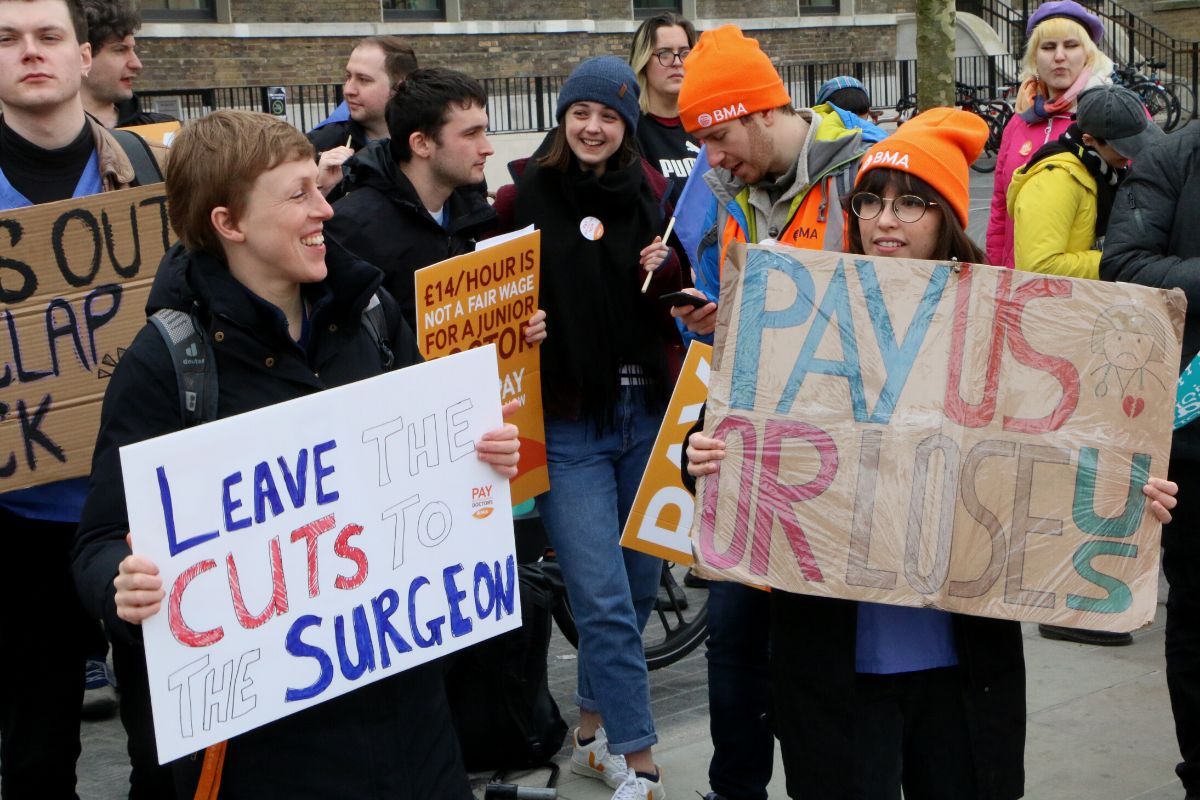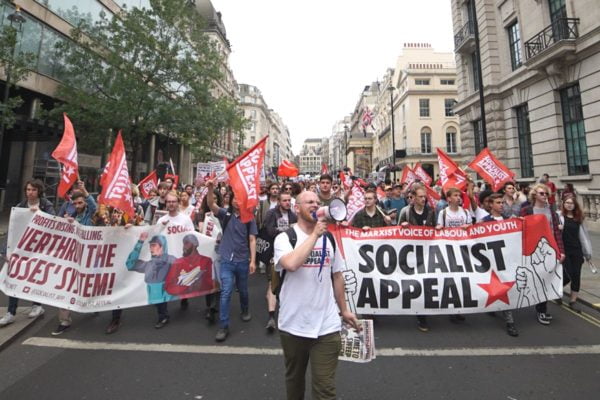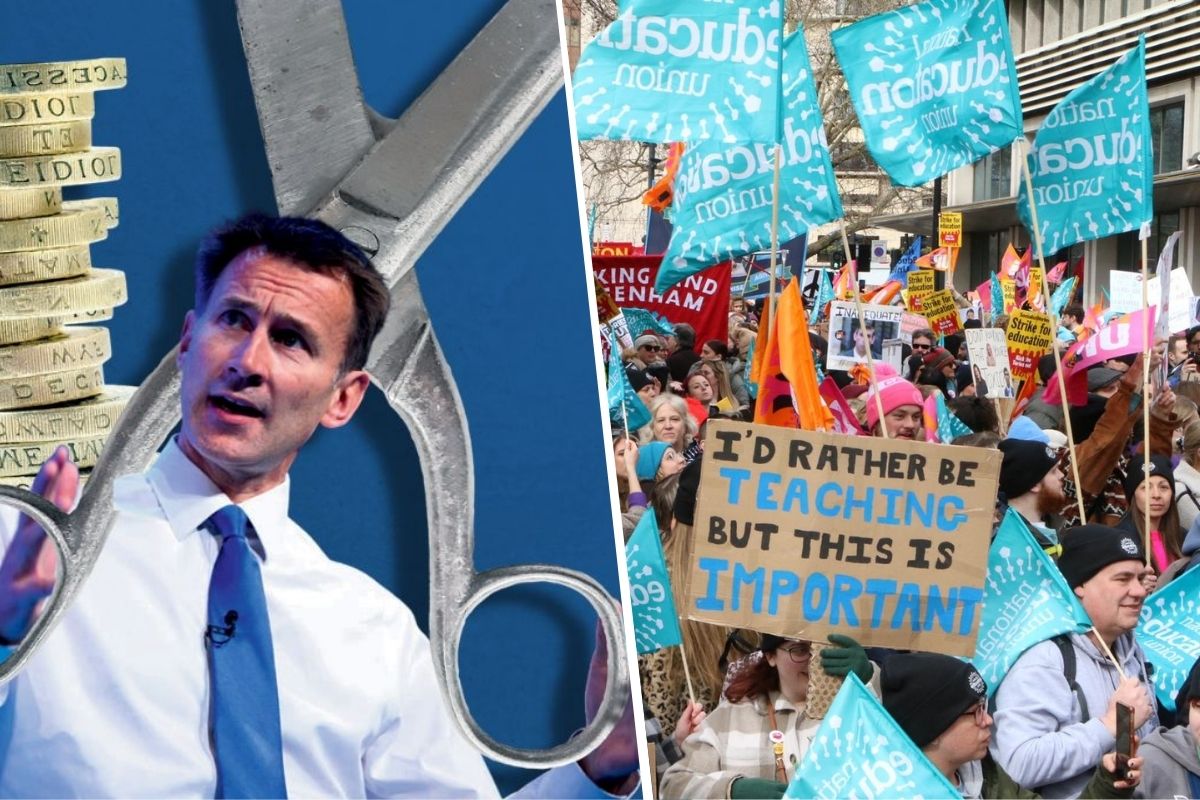Chancellor Jeremy Hunt received whoops and cheers in Parliament yesterday, as Tory backbenchers applauded his latest billionaires’ Budget.
Not far away in Trafalgar Square, by contrast, the roar of hundreds of thousands of public sector workers could be heard echoing around the streets, as striking teachers, civil servants, lecturers, Tube drivers, and junior doctors came together to demand a proper pay rise.
Hunt’s spring statement received praise from across the capitalist press, with its bungs for big business and its ‘professional’ delivery.
After years of chaos under successive Tory administrations, the establishment are clearly pleased to see the serious adults back in Downing Street, attempting to restore order and deliver the policies that the bosses want.
The contents of the Chancellor’s Budget was more notable for its absences, however. Most importantly, to the exasperation of the trade union leaders, there were no promises on public sector pay.
The class struggle, in this respect, is only set to sharpen. And whilst the ruling class may hope for calm waters ahead, all indicators point to further storms on the horizon for British capitalism.
And that is before further sharp turns and sudden changes in the fragile world economy – like a new financial crisis – are even added into the equation.
Lost decade

Accompanying forecasts from the OBR (Office for Budget Responsibility) provide little cause for optimism. The UK economy might technically avoid a recession this year. But for ordinary people, the coming years will feel like a recession – as is already the case.
According to OBR estimates, economic output will not recover to its pre-pandemic amount until the middle of 2024. And whilst inflation is predicted to fall below 3% by the end of the year, the estimated 5.7% squeeze on household incomes between 2022-24 will still represent “the largest two-year fall in living standards since records began in the 1950s”.
Consequently, real living standards are expected to still be below pre-COVID levels in 2028. As Financial Times writer Martin Wolf notes: “That is almost a lost decade and comes on top of a very poor previous decade.”
It’s not all doom and gloom, however. According to new research from Unite the Union, UK corporations are laughing all the way to the bank. FTSE 350 firms, the report finds, saw their profits jump by 89% in the first half of 2022, compared to the same period in 2019. From energy to supermarkets: the bosses have never had it so good.
Workforce exodus

The main motif of Hunt’s speech was ‘growth’, with a range of measures intended to boost business investment and workforce participation.
One major headline announcement by the Tories, for example, was the expansion of free childcare provision to one and two year-olds. But nurseries have already highlighted how, in the absence of adequate additional funding, this will simply add to the strain on overworked, underpaid staff.
And the same theme – of workers bearing the burden for the special crisis of British capitalism – can be seen playing out across Britain’s public services.
Labour shortages can be seen in almost every sector: the product of accumulated stresses and pains, on the one side, as workers are pushed to breaking point by ruthless bosses, seeking to squeeze out ever-greater profits; and of deteriorating healthcare and mental health services, on the other.
But clearly the Tories have no plans for addressing these endemic problems and pressures. Instead, they and their capitalist chums will be demanding that workers shoulder even more weight in the months and years ahead.
Whilst there were giveaways for Tory voters, there was nothing on offer for the NHS and its tireless staff; no suggestions of ending austerity, or of giving councils, schools, and hospitals the money that they so desperately need to provide reliable services to users, and decent pay and conditions to workers.
No wonder placards could be seen everywhere on yesterday’s inspiring half-a-million-strong demo in London saying ‘WTF!?’ – WHERE’S THE FUNDING!?
Strikes and demonstrations in GB: Teachers, junior doctors und Tube workers walk out and fight for higher wages.
Streiks und Demonstrationen in GB: Lehrer, Assistenzärzte und U-Bahn Fahrer legen die Arbeit nieder und kämpfen um höhere Löhne. pic.twitter.com/Cl0TUzi81c
— ZDF Studio London (@ZDFlondon) March 15, 2023
Elephant in the room
The Chancellor might pay lip service to the idea of helping people back to work. But the suggestions proposed by the government are little more than a sticking plaster.
At the same time, by repeatedly offering public sector workers insulting below-inflation pay deals, the Tories are actively exacerbating the haemorrhage of teachers, doctors, and nurses from these much-needed professions.
Burnout and exhaustion resulting from understaffing are bad enough. Forcing workers to rely on foodbanks, and adding to their worries about how to pay for rising rents and bills, is rubbing salt in the wound.
The question of public sector pay, in this respect, was the “elephant in the room”, stated TUC general secretary Paul Novak.
“The Chancellor had a chance to save the NHS,” asserted Unite general secretary Sharon Graham. “Instead, he made the wrong choices and delivered a historic betrayal.”
But Hunt and co. haven’t made any “wrong choices” or “betrayed” anyone. Their loyalties lie with the bosses and bankers, not with the working class. It is the capitalists whose interests they serve, not workers. And their stubborn refusal to offer a real pay rise is entirely consistent with these aims.
Carrot and stick
From the start of these disputes, the trade union leaders have been desperate for a deal. Their entire strategy has been based on moralistic appeals to the government – calling on the Tories to ‘see sense’, come to the table, and make an offer that can amicably end the strikes.
Yesterday, for example, ASLEF head Mick Whelan remarked that the Chancellor’s Budget was “disappointing”, showing “an absence of a serious plan to resolve the industrial strife in our public sector”.
The government would clearly also like to “resolve the industrial strife”. But only on their terms. And this means deploying a carrot and stick: offering dodgy deals to some sections of workers, such as certain health unions, in an effort to splinter the movement; and isolating and repressing the most militant unions, in order to break their backs and impose the employers’ demands.
The union leaders must not fall for these Tory divide-and-rule tactics. The movement cannot allow any workers to be left behind. Unity is strength.
The call from the unions must be: either we’re all around the negotiation table, together as one voice, or none of us are.
Instead of compromise or collaboration, the trade union movement must take note of the words of left-wing Labour MP Zarah Sultana from the rally platform yesterday: “This is a class war!”
RMT assistant general secretary John Leach emphasised the way forward, in this respect: “We will not beg! We don’t beg to no-one. What we’re gonna do is what you’re doing: stand shoulder-to-shoulder and fight – fight til we win!”
🎥 “We will not beg.”@RMTunion Assistant General Secretary John Leach speaking at today’s @NEUnion rally in Trafalgar Square#EnoughIsEnough pic.twitter.com/ix5hooRXgD
— RMT (@RMTunion) March 15, 2023
Unity and escalation
Sultana and Leach are 100% correct. This is a class war. And the only way for workers to win this battle is by remaining united, and going on the offensive.
Yesterday’s massive demonstration – the largest trade union protest and coordinated action in over a decade, with around 700,000 out on strike together – highlights the potential power and strength of the movement.
The confidence amongst teachers and junior doctors was palpable, as they shut down schools and surgeries, forged joint picket lines, and took over the streets. But this determination and dynamism from below must now be matched by militancy and audacity at the top.
Left-led unions like NEU and PCS have correctly refused to cave in to the government’s demands for them to call off scheduled strike action before beginning pay talks. And they have led the charge in terms of pushing for coordinated walkouts, like those seen this week and on 1 February.
But even here, weaknesses are evident. Yesterday saw separate demos organised by these unions in London, for example, with strikers marching separately and converging at the same rally. And only a small handful of contributions on the microphone explained the common enemy shared by all workers: the Tories and the bosses.
Similarly, whilst there have been efforts by striking workers to coordinate at a local level, national campaigns and organisations – like ‘Enough is Enough’ and the TUC – have done little to help activists on the ground; for example, by providing direction on how to set up cross-union strike committees in different areas and workplaces.
Also notable by its absence yesterday was any suggestion of the next steps for the movement. No further days of action have been called, as yet. Some unions, such as those in the NHS, are hoping to secure a deal. Others, in turn, will come under pressure from the government and the employers to ‘be reasonable’ and follow suit.
Instead, what is required is escalation. Rather than acting as a bargaining chip, yesterday’s momentous march should be the launchpad for a mass campaign of action, including plans for building towards a one-day general strike.
Revolutionary leadership

Above all, what is needed is a clear, bold, socialist programme, around which all of the struggles can unite and mobilise.
This must include demands to: reverse all austerity and privatisation in Britain’s public services; link pay increases to inflation, with a sliding scale of wages; and nationalise the banks and major monopolies, in order make the bosses pay for this crisis.
The era of reforms is long behind us. Instead, all of the gains won by previous generations are being ripped to shreds as the crisis of capitalism deepens. Neither the Tories nor Starmer’s Labour have any solutions. And nor do the old ‘lefts’, who cling to the utopian idea of a ‘nicer’, ‘kinder’ form of capitalism.
Only by overthrowing this rotten system, and transforming society along socialist lines, can we solve the dire problems bearing down upon the working class.
Join the Marxists today, and help build the revolutionary leadership required to make this reality.






